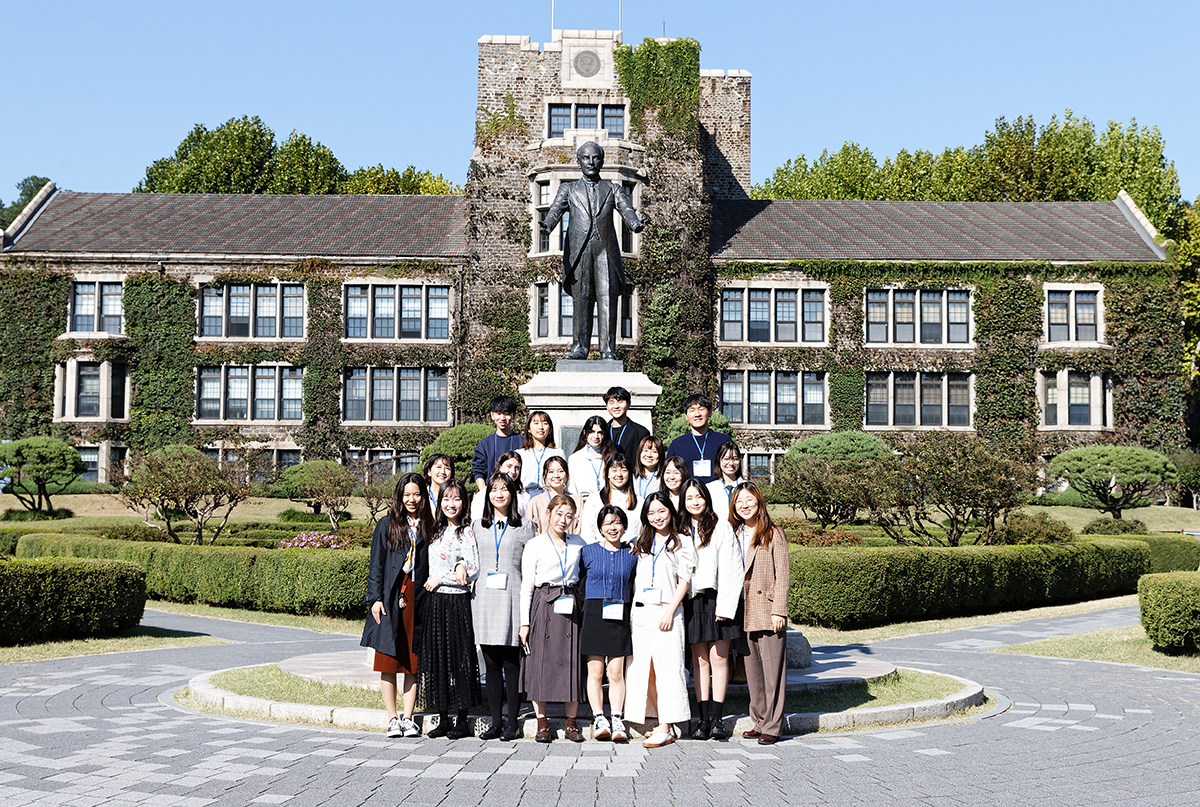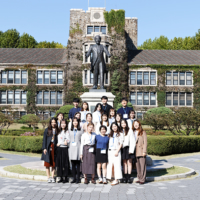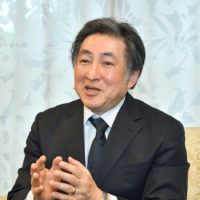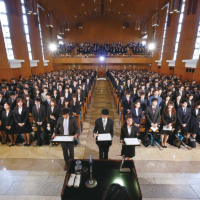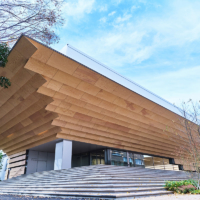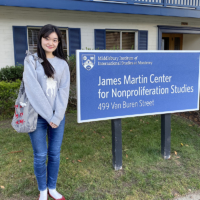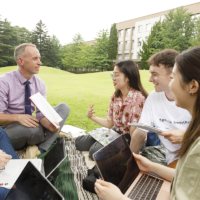“World peace is an ideal, and that is all the more reason to strive for it,” said International Christian University President Shoichiro Iwakiri. His position reflects the liberal arts college’s founding charter as a school for realizing that very ideal. Over the past 70 years, this small private institution in the west Tokyo suburb of Mitaka has graduated some of the brightest minds with a global, bilingual education grounded in the pursuit of peace. The university intends to steadfastly continue on the same mission, at least until there is peace on Earth.
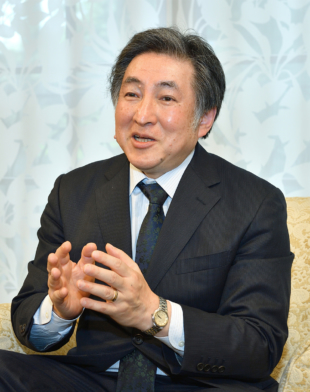
“Peace has probably never been realized. There may be peace in some parts of the world, but it might not be possible for the whole world to be at peace. There will always be conflicts somewhere … but human beings have the unique power to pursue the impossible,” Iwakiri said.
The peace the president refers to is better known as political peace, or the absence of war — a condition that is necessary for human beings to be able to enjoy comfortable lives. At the same time, the university realizes that internationalization, relationship-building and understanding one another, as well as oneself, are all necessary for peace to exist.
Experience at a young age
“It is very important to interact with and understand people with different backgrounds at a young age. In this sense, internationalization is very important. To actually meet people and experience the world with others, instead of just receiving information. To visit the countries and breathe the same air as people of the same generation. If they have these experiences when they are young, they are unlikely to have problems in the future,” Iwakiri said. “If they have strong human-to-human relationships, they won’t want to harm anyone. This is especially important for students to experience at a young age, when they are still very flexible.”
Because of its sustained and straightforward commitment to peace, ICU was one of the first Japanese institutions to denounce the Russian invasion of Ukraine, Iwakiri said. In addition, through grant funding from the Japan International Christian University Foundation, five Ukrainian students are starting full-time degree studies at ICU this year.
“ICU was perhaps the first university to announce that it would support students until graduation. We will support them all the way. That’s certainly in line with our mission of peace and it’s a social contribution as well.”
Reconciliation study program
In 2018, ICU started the Syrian Student Initiative, offering annual scholarships to refugees from the conflict in Syria. A more recent partnership for the university concerns postwar societal implications. Last October, ICU established a one-semester study exchange program with South Korea’s Underwood International College, Yonsei University. Under that program, 10 students from each university study together on the overall theme of “Reconciliation — a New Generation of Japan-South Korea Relations.” The program involves five interdisciplinary lecture courses, class discussions and theme-related field trips.
“When peace comes after war, we are still left with the memory of our painful experiences, or even some of our own actions, so reconciliation is tied to peace, and is necessary in the context of Japan-South Korea relations,” he said.
Students also have opportunities to gain real-world peace-building experience in Japan through a partnership with Nagasaki University. These events allow ICU students to participate in public service projects at the Nagasaki Atomic Bomb Museum and the youth peace forum in Nagasaki.
At ICU, peace is at the core of the curriculum and there are specific courses that delve into the matter. The university also hosts a branch of the world-renowned Rotary Peace Center, allowing Rotary peace fellows to take courses in peace and conflict resolution, among other subjects, with the eventual goal of earning a master’s degree.
ICU students are not required to specifically study peace, but they are asked to sign the Universal Declaration of Human Rights, a document that enshrines the fundamental rights of all people, on the day of their matriculation ceremony. This underpins their journey through a true liberal arts program.
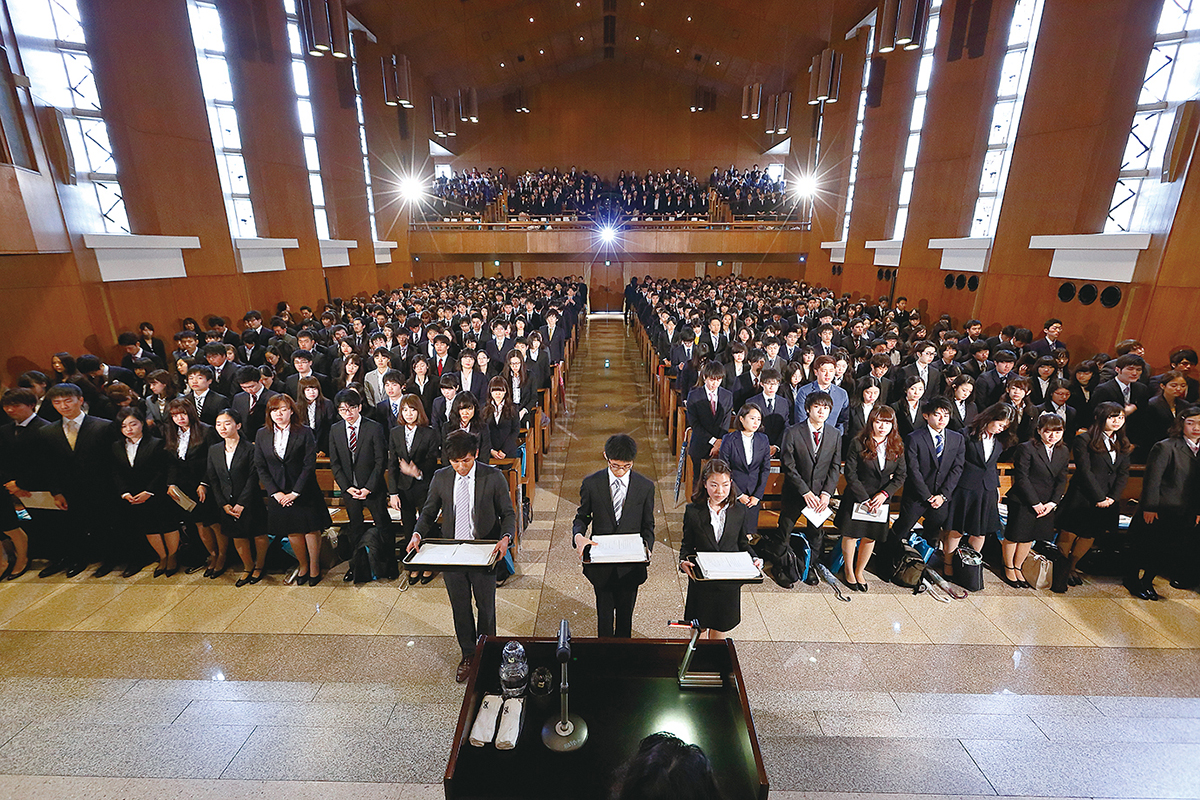
Liberal arts education
The curriculum, which spans the humanities and natural and social sciences, emphasizes exposing students to a wide range of disciplines in their first two years of study. Students then choose from among 31 majors in the latter half of their degree.
“Through our liberal arts education, students acquire the ability to build a diverse network of knowledge within themselves, as well as the ability to build diverse knowledge pathways within society,” Iwakiri said.
Such diversity is reflected by the recent achievements of two of its scientists. Professor Kenya Kubo, for example, was part of a team that last year published its analysis of the elemental composition of rock samples brought back to Earth from the Ryugu asteroid by the Hayabusa2 spacecraft. In addition, until 2025, associate professor Rekishu Yamazaki will be part of the Moonshot Research and Development Program promoted by the Japan Science and Technology Agency, developing a quantum memory that can perform the conversion between optical and electrical quantum signals.
This year, students and faculty will benefit from a new four-story building that symbolizes the university’s dedication to the arts and sciences. Designed by Nihon Sekkei Inc. and Kengo Kuma & Associates, the Troyer Memorial Arts and Sciences Hall houses labs and research institutes for all fields of study, as well as classrooms and a common space where everyone can interact.
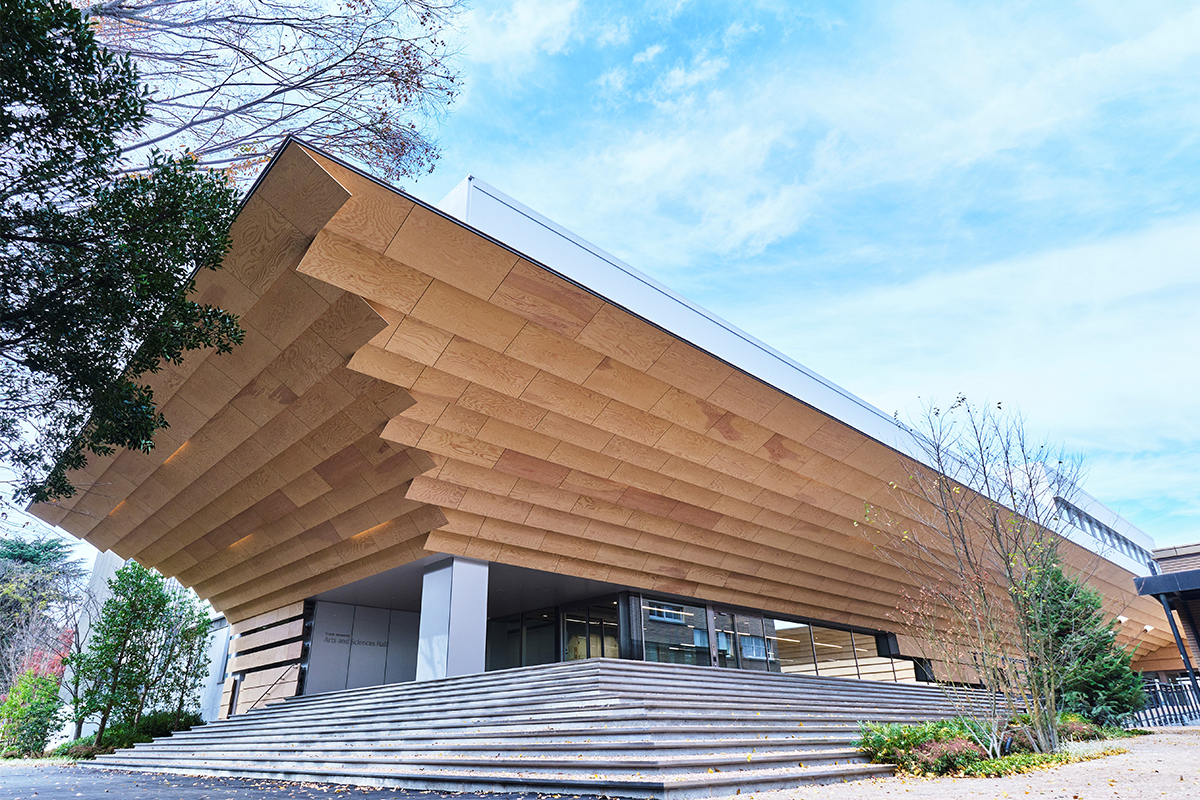
Building basis for peace
Liberal arts programs are common, but what sets ICU apart is that its program is university-wide. Studying in both English and Japanese will help broaden students’ viewpoints, helping to nurture them into becoming global citizens.
“Peace is not just a concept, but a concrete relationship between people, and through dialogue, there is diversity. From a critical thinking point of view, we do not impose our own ideas on others, nor do we simply criticize them. We train our students to discuss critically, to create something in the process, and to reconcile their opinions. This kind of training is an important basis for students to think about peace and how to think about things when they go out into the world,” Iwakiri said.
The university does push students to internationalize through its exchange partnerships with dozens of universities around the world. It also promotes diversity, as represented through around 180 non-Japanese students enrolled. In addition, a third of its faculty hail from about 20 countries. Still, the school emphasizes learning about oneself and one’s own country, which helps facilitate the dialogue needed to establish lasting peace.
“If everyone around you is doing the same thing, then you have no need to explain yourself. At ICU, however, all the people you’re in class with could have many different academic interests. This means you have to explain who you are and what you’re doing, and you also have to ask questions, so you can know more about others. These things are built into our liberal arts education.”
Studies spur grad to embark on no-nukes mission
The night before her elementary school trip more than a decade ago, Fukuoka native Kokoro Nishiyama was probably feeling like most of her peers: giddy with excitement. She would travel, eat, and chat endlessly with her friends — all outside of school. After the excursion, perhaps she was even more gleeful, with a stockpile of stories for anyone who would listen.
But the International Christian University graduate brought back something else from her class visit to the Nagasaki Atomic Bomb Museum. Something that would determine her academic journey and set before her the task to which she would decide to dedicate her life. That unforgettable keepsake was a burning curiosity about peace.
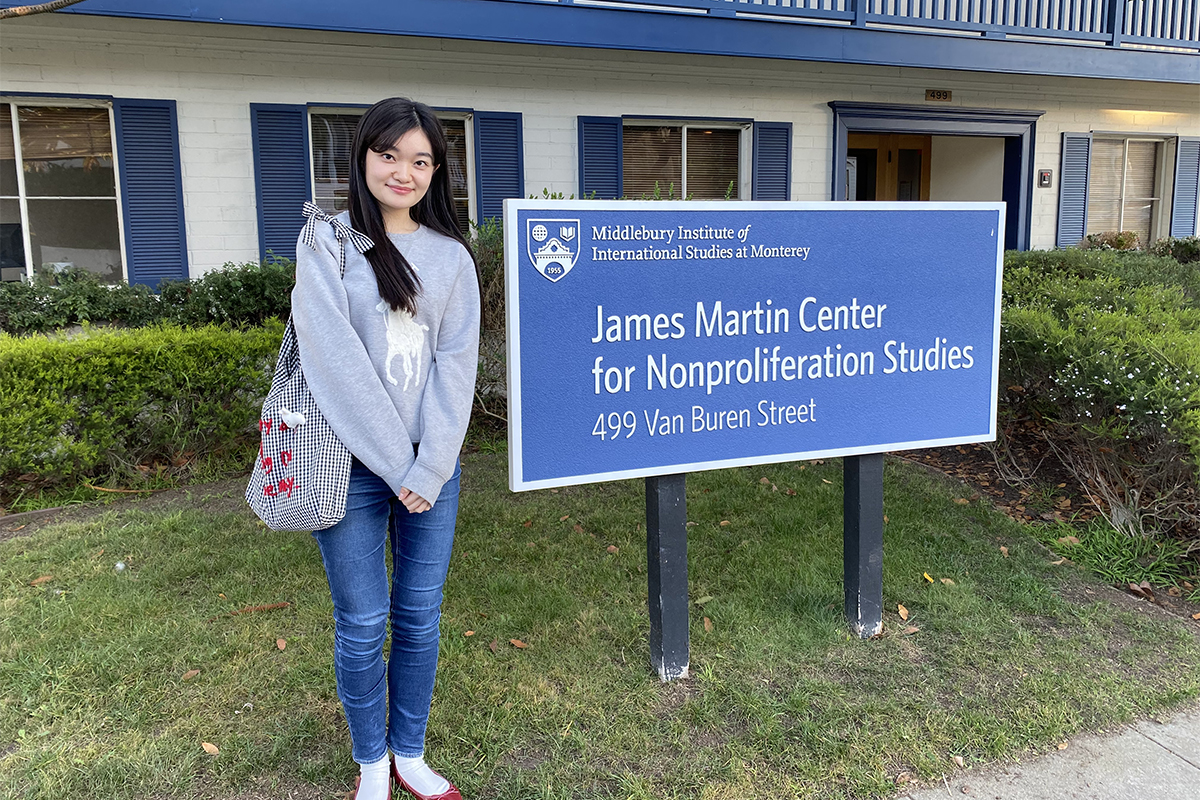
Currently, Nishiyama is studying terrorism and weapons of mass destruction at the Middlebury Institute of International Studies in the United States. She is part of the Accelerated Entry Program, which allows selected students to earn both a bachelor’s degree from ICU and a master’s degree from Middlebury in as little as 5½ years.
“I first started to think about peace when I visited the Nagasaki Atomic Bomb Museum on a school trip in the sixth grade. The legacy of those who were robbed of peace by the atomic bomb 78 years ago is what shapes who I am today in my pursuit of peace,” Nishiyama said.
Upon completing her program, she intends to move on to doctoral studies. However, Nishiyama has already had somewhat of a career in peace. During her second year of junior high school, she transferred to a school 500 meters away from the hypocenter of the atomic bombing. One of the school’s programs was Nagasaki peace studies.
“I was a member of the peace study club all throughout high school, and I became a youth communicator for a world without nuclear weapons for the Foreign Ministry. In that role, I worked to preserve the memories of the atomic bombings using digital archives. I continued this work in graduate school and I am currently attending a workshop on digital archiving as a facilitator.”
It was also in high school that Nishiyama received the final catalyst to cement her future pursuits. She participated in the Critical Issues Forum, a program sponsored, incidentally, by the James Martin Center for Nonproliferation Studies at MIIS, where she currently studies.
“I had heated discussions on nuclear disarmament and peace with students from the United States and Russia. That’s when I decided that I wanted to work for an international organization on solving nuclear issues.”
Her intentionality of purpose was what Nishiyama used when choosing where to go after high school. She had three boxes that her university of choice had to tick. It had to be somewhere she could study global issues, receive rigorous English-language training, and since she had always attended Christian schools, that was a requirement as well.
“That’s when I came across ICU, which offers all three,” she said.
“The liberal arts education at ICU helped me develop a flexible outlook and world-class English skills. Every lecture was full of opportunities to explore a single issue from multiple perspectives, which helped me to examine issues in an unbiased way. I was also able to hone my English skills by actively choosing to take courses offered in English. The experienced professors and diverse student body helped me to grow through lively discussions,” she said.
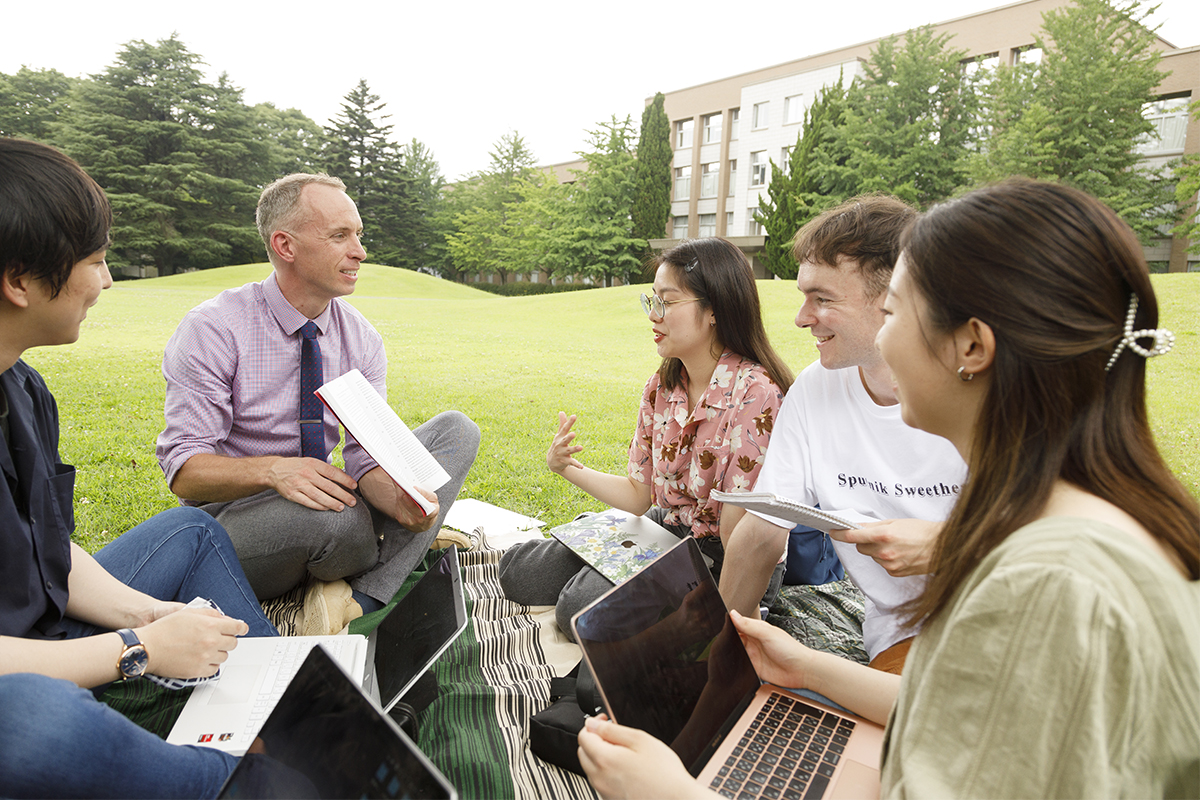
In fact, having been exposed to that way of studying, when Nishiyama was deciding on graduate work, she knew she wanted a chance to study both the science and politics of nuclear weapons.
“Currently at MIIS, I take courses such as science and technology, strategic export control and other intensive courses that cover a wide range of issues surrounding nuclear weapons. Also, since I am the only Japanese student in my class, I am often asked to give my opinion on Japan as a whole, which has been a valuable experience.
“My goal in life is to repay my debt of gratitude to Nagasaki for conveying the importance of peace to me. I can carry the torch of peace in my heart despite my daily struggles because I studied at ICU. It is the university for tomorrow to me. The liberal arts education that I received there will continue to guide me toward my future self,” Nishiyama said.
Each year, ICU produces a cohort of a mere 600 or so graduates. However, its alumni are some of the biggest names in many fields, including international development, academia and industry. ICU President Shoichiro Iwakiri attributes this to the strength of the curriculum, and the skills imparted at the school.
Alumni include Tetsuro Higashi, former chairman of Tokyo Electron Ltd., Japan’s leading supplier of semiconductor production equipment, and Kazuo Hirai, former chairman of Sony Co., which later became Sony Group Corp. Higashi now chairs Rapidus, a new company funded by Nippon Telegraph and Telephone Corp., Toyota Motor Corp., Sony and other big companies aimed at revitalizing chip production in Japan.
“There are people who contribute directly to peace, and there are also people in the business world, people who have become academics and people who have become teachers. The current chairman of the board of trustees is Hirotaka Takeuchi, an ICU graduate who is now a professor at Harvard Business School. Despite only having about 30,000 graduates over 70 years, they are active in many fields,” Iwakiri said.
One fundamental reason for this success may be the university’s liberal arts approach, which allows students to study a broad range of subjects. Nishiyama took advantage of and thrived in that diversity.
This page is sponsored by International Christian University.
International Christian University

Address: 3-10-2 Osawa, Mitaka-shi, Tokyo 181-8585, Japan
Tel: +81-422-33-3040
E-mail: [email protected]
URL: http://www.icu.ac.jp/en/



